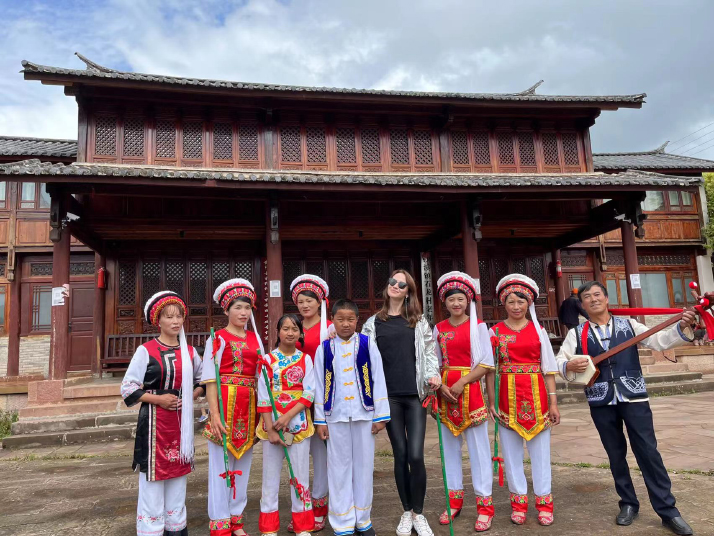| Lifestyle |
| Made in Yunnan | |
|
|
 The author with local Bai people in Dali, Yunnan Province (COURTESY PHOTO)
The old proverb that "the mountains are high and the emperor is far away" may be the reason why local people in Yunnan Province have such a laid-back attitude and open-minded outlook. This was certainly the view I came away with after visiting as part of a delegation of foreign and Chinese reporters. My another goal of the trip was to get a better understanding of the mentality and cultural identity of the Bai people, one of the most widespread ethnic minorities in southwest China. Dali has gained a reputation as a fashionable city thanks to its mix of traditions and modern living. As such, I was ready to enjoy hipster trends incorporating all kinds of natural elements. The slow pace of life there gave me the pleasant feeling that I was on vacation. No wonder Dali has been recognized as "an ancient capital at the crossroads of Asian culture." Cozy coffee shops, craft beer bars and tea shops stand alongside clothing stores selling handmade fabrics that captivated me with their abstract patterns and sky-blue tints. That is how I became acquainted with the signature color of Dali as well as its famous tie-dye craft. "There is one life—in Dali. There is one color—blue," said the co-founder of Lanxu Eco-Culture Development Center. It was only after I noticed his blue nails that I realized Zhang Bin wasn't joking. This craftsman knows firsthand about the ancient Ming Dynasty (1368-1644) tie-dye practice. The mission of preserving ethnic art has become a matter of life for him for the past eight years. He told me that one day he decided to trade his prestigious career in Beijing for the opportunity to teach the children of Yunnan how to dye fabrics. "My dream is to save the environmentally friendly tie-dye craft and promote it among the younger generation," he said. My second insight into the mindset and culture of Bai people snuck up on me in Shilong, a small mountain village near Shaxi Town in Dali's Jianchuan County. The rural area began to flourish after 2004, when the authorities rebuilt the main road, and the local farmers discovered delicious matsutake mushrooms. Nowadays, tourists can visit the once-isolated village by car and enjoy restaurants serving short beef noodles, fried dough twists and cheese fans. That is not to mention the surprisingly tasty cactus dessert—a delicious addition to the village's intangible cultural heritage. I almost forgot that I had arrived with my colleagues to learn about the traditional Bai music and whip dancing. A group of young performers sang for us in their local dialect about poverty alleviation and their new prosperous life. As we watched, a group of village kids had gathered and were also watching us. From the curious and innocent look in their eyes, it was obvious they'd never seen foreigners up-close before. I tried to talk to them, but they were either shy or didn't understand my broken Chinese. "They study both putonghua (standard Chinese) and the Bai dialect at school. They must just be afraid of us," concluded my Rwandan colleague. As we walked back to the bus along the new paved road, I suddenly noticed a boy from the group of little spectators was running after us. He handed us a rolled-up piece of blue paper. In childish, uneven handwriting, was a message written in Chinese: "My name is Dong Wei. Nice to meet you, friends!" I never expected such an openness and readiness to welcome the whole world from kids in rural China. We left the village with a handful of colorful stickers. How can you understand more about an ethnic group if you only have limited time? Learning what locals eat and wear is certainly a good start. Researching what they joke and dream about is a challenge. The Bai people touched my heart with their free spirit, ingenuity and courage to remain authentic in the era of modern technology. The bold 6-year-old Dong from Shilong will forever be what comes to my mind when I think of the Bai people and Yunnan. The author is a Russian living and working in Beijing Copyedited by G.P. Wilson Comments to dingying@cicgamericas.com |
|
||||||||||||||||||||||||||||||
|